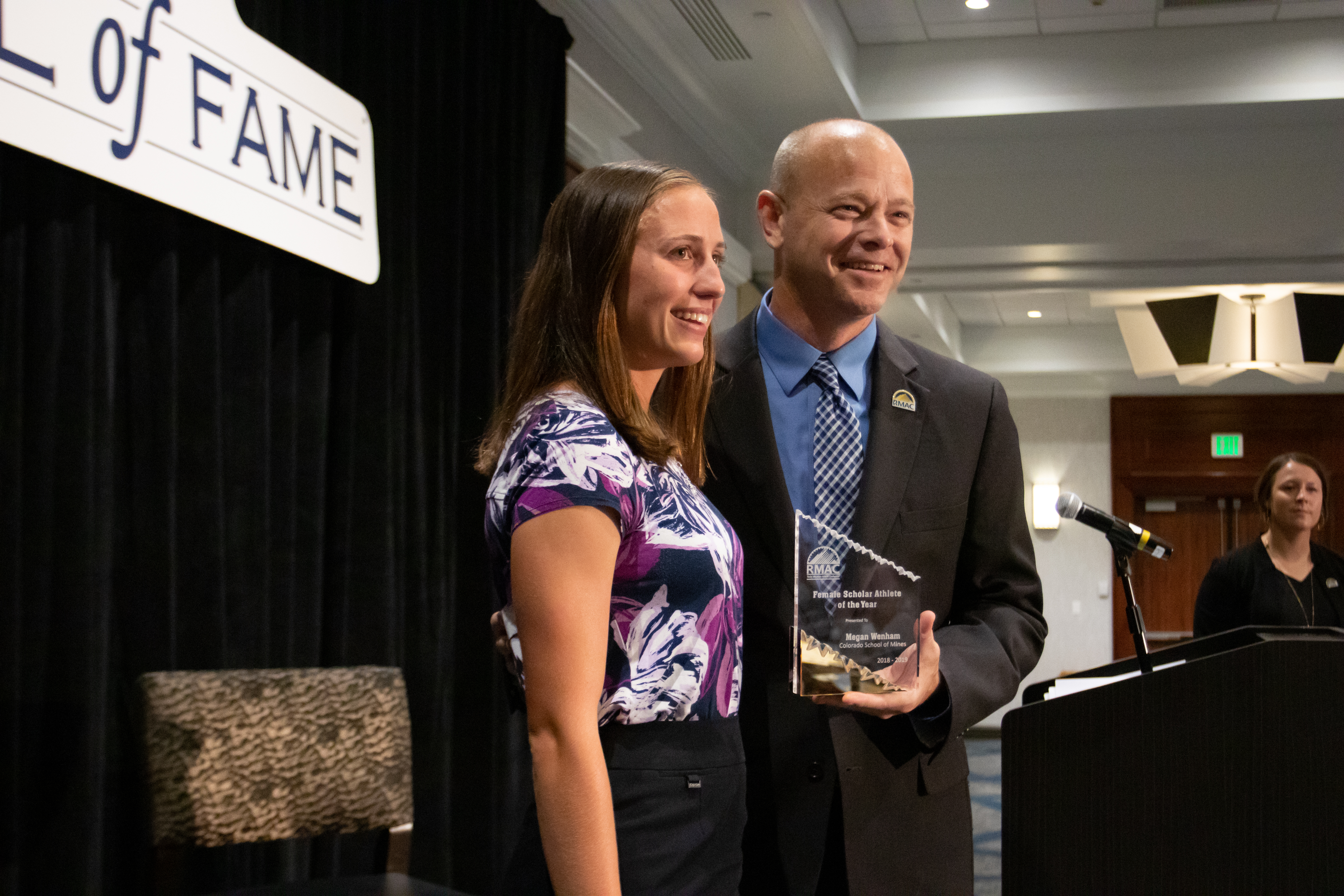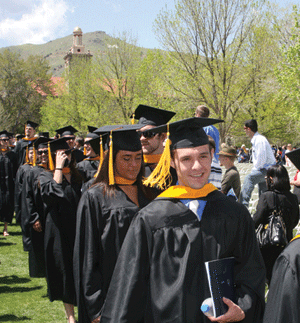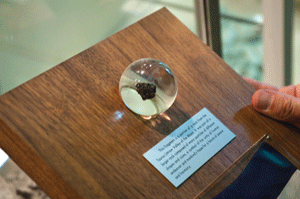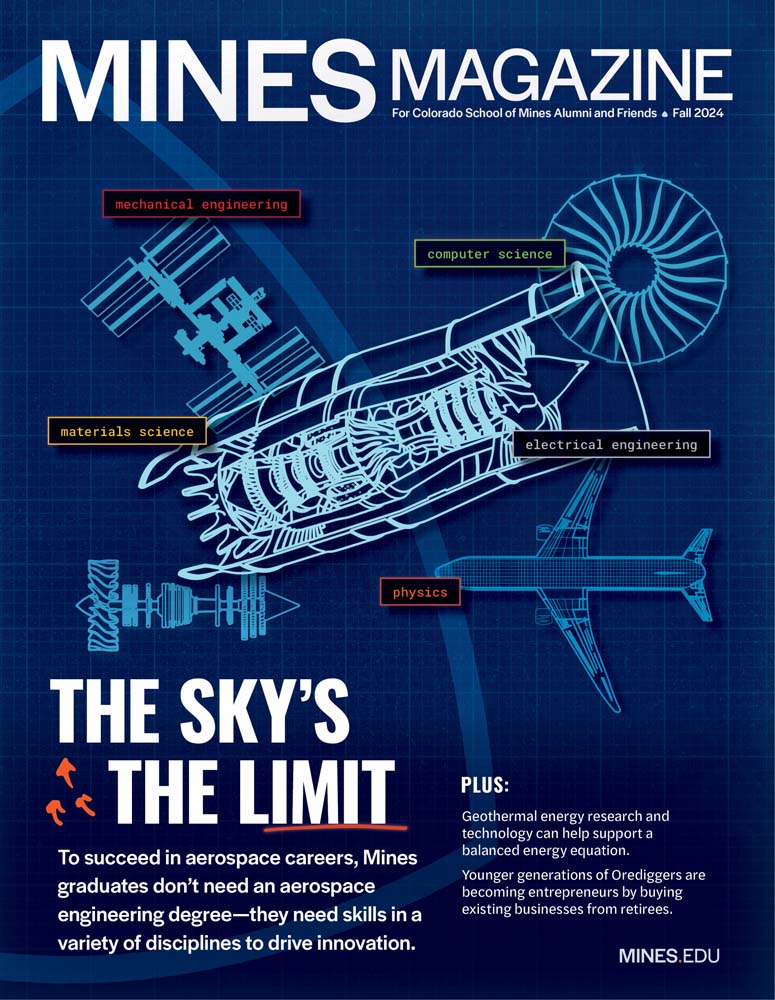A balancing act


The balance between the classroom and competition is one that Mines student-athletes master every year. It’s not easy fitting in lectures, labs, homework and projects with training, practices, travel and competition. But despite these pressures, Orediggers have continued to excel at both sides of the equation.
In 2018-19 alone, Mines Athletics had five RMAC Academic Athletes of the Year and an all-time record of 16 Academic All-Americans, while distance runner Megan Wenham ’19 became the first Oredigger to earn the RMAC’s highest honor, the Scholar-Athlete of the Year Award. More than half of the more than 400 Mines student-athletes held a 3.0 or above cumulative GPA after the spring 2019 semester, including 142 with a 3.5 or better. Oredigger teams combined held a 3.18 departmental GPA in 2018-19, on par with the student body as a whole.
To reach those lofty heights, organization and resourcefulness are key.
“When I’m training, and I have multiple workouts a day, I have to prioritize a lot more,” said Jake Feldman ’19, a starter for the RMAC-champion wrestling team. Feldman received his bachelor’s degree in metallurgical and materials engineering in May and is currently working on a master’s degree in engineering and technology management while competing in his final season. “I’ll build a list every day—practice at this time, lifting at this time, classes later in the day. Some weeks are worse than others, but it works out.”
While carefully budgeting her time was also important for Wenham, she explained that self-care was key to her success both on and off the field, a practice that contributed to her RMAC Scholar Athlete Award win this year. “Athletics gets exponentially more difficult the second you stop taking care of yourself, so I always made a conscious effort to get enough sleep and eat good foods between all the homework and training,” she said. “It’s the little things you do every day, like drinking water and getting sleep, that really make a difference in how you perform, both academically and in athletics.”
Traveling for competition puts extra pressure on academics because it often takes student- athletes out of the classroom and lab. In 2018-19 alone, the Mines wrestling team covered more than 8,000 miles on the road and in the air, but that doesn’t mean they’re given a free pass in class.
“I’m really used to studying on buses,” Feldman said. “And if we’re at a hotel and we have breakfast at 9 a.m., I’m up at 7 a.m. studying, and most of my teammates are doing the same thing. We know we have a job to do at the meet but also have to take care of business at home.”
Tyler Kimble, who is entering his 14th season as the head coach of men’s golf, has seen how his golfers have adapted to being away from home as they often compete on weekdays.
“It’s very easy to get behind here because we have so much hands-on lab work,” Kimble said. “[Athletes] have to be really proactive—they have to learn when other lab times are to make it up and constantly communicate with teachers to reschedule and make up the work.”
Kimble also credits relatively new learning tools, such as digital textbooks and online homework portals, with making a positive impact on his student-athletes’ success. Taking advantage of those resources helps keep them on track. “Some of our coaches even find that the grades are a little bit better in-season because they’re so focused,” he said. “They’re constantly on point—they can’t slack off at all.”
But Mines student-athletes also have to contend with the pressure of remaining eligible to play in such a challenging academic environment. Under NCAA Division II rules, Mines student-athletes have to pass nine credits every semester. On top of that, they need to complete 24 credits in any given year, meaning that if they’ve only done the minimum nine in a semester, summer classes will be required to make up the difference. By the end of each summer term, a student-athlete’s cumulative GPA must be a 2.0 or above.
NCAA rules and Mines academic offerings have evolved over time, and in some ways, that’s been to student-athletes’ advantage. Dixie Cirillo has seen the changes firsthand working at Mines since 1991, including as Mines’ associate athletic director in charge of NCAA compliance and academics since 2005. She points to the expansion of support resources such as the Center for Academic Services and Advising and the Multicultural Engineering Program as a major factor in student-athlete success. As a result, out of approximately 425 student-athletes in any given season, you can usually count the number who are ineligible on one hand.
“There are more places for kids to fit now,” said Cirillo. “With changes to the engineering program over the years, adding majors like electrical, mechanical, environmental and computer science, it’s been huge for athletics and our athletes.”





